Home > About Us > UNHCR People > Prominent Refugees
Prominent Refugees
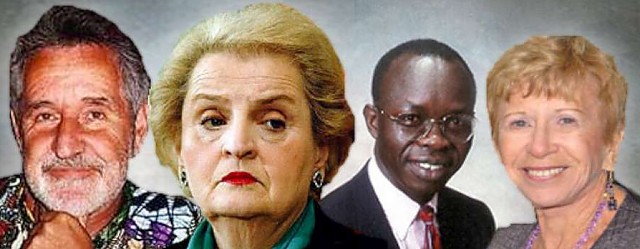
Refugees Who Have Made a Difference
Refugees or former refugees who have achieved special status within a community due to their achievements, or because they have overcome hardship to build a new life.
This gallery features profiles of some 200 refugees who have made a difference and left a mark in the world. The list includes people, dead and living, in all walks of life. Some, like writer Chinua Achebe, composer Bela Bartok, physicist Albert Einstein and actress-singer Marlene Dietrich are world famous, others have shared their gifts locally. The UN refugee agency salutes all of them for showing the potential of refugees around the world.
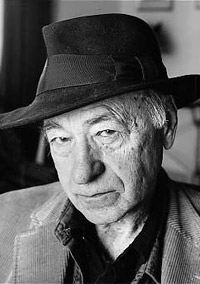
Filmmaker Jonas Mekas spent his childhood as a farmer's son in the countryside of northern Lithuania and he has taken those memories with him all over the world.
After finishing high school in 1943, his involvement in local anti-Nazi resistance led to an exile that would last a lifetime. In 1944, he and his brother were captured by the Nazis and sent to a labour camp near Hamburg. The two managed to escape, alternating between forced retreats and stays in refugee camps. During this period as a displaced person, Mekas began writing poems about his lost country and village.
After the war, he studied philosophy and romance languages at the University of Mainz, Germany, and co-founded an avant-garde magazine, Vilgsniai (Glances), with a group of Lithuanian writers, including his brother. One of his first book of poems, a rural epic called "Semeni-kiu idiles" ("Semeni-kiai Idylls"), published in 1955, gives a moving account of his memories of the village where he grew up.
Today Mekas holds an important place in the history of exile literature; his book of poems, "Reminiscences" (first published in 1972), is a harrowing account of his exile and trek through the pitiful ruins of war-torn Germany. But he is known equally for his role in cinema.
Two weeks after arriving in the United States in 1949, he and his brother bought a movie camera to capture their impressions of everyday life in Brooklyn. The brothers struggled to raise money for films, living on free food samples and rice, while trying to avoid arrest for shooting without a permit.
In 1953, Mekas launched his first film-screening programme at Gallery East. The following year, he founded and edited Film Culture, a magazine devoted to experimental cinema. He went on to establish a film column at the weekly, Village Voice, which he called Movie Journal. He was an influential figure in the cultural flowering in Greenwich Village.
Mekas helped organise the New American Cinema Group (1960) and founded the Film-Maker's Co-operative (1962), one of the largest distribution centres for independent films, as well as the Film-Makers' Cinémathèque (1963). He showcased films that rarely appeared in commercial theatres, remaining unflagging in his dedication even after he was arrested and charged for screening "Flaming Creatures" by Jack Smith, which was deemed to be obscene. Mekas continued to challenge the censors and push the limits of what could be shown.
He joined Andy Warhol and his Factory along with other "New Sexual Freedom Riders" to form the nucleus of the New York underground movement of the 1960s. Mekas would acquire a legendary role as the pioneer of American avant-garde cinema. He also co-founded the Anthology Film Archives in 1970, which specialised in preserving and presenting avant-garde films.
About Warhol's Empire, he commented, "If all people could sit and watch the Empire State Building for eight hours and meditate upon it, there would be no more wars, no hate, no terror - there would be happiness regained on earth." For him, even the mistakes and imperfections in film expressed the true and the beautiful.
"Reminiscences of a Journey to Lithuania" (1972) documents Mekas' initial experience in America and the brothers' reunion with their mother in 1971, haunting traces of memories and emotions. Mekas later commented, "You don't see Lithuania as it is today but through the memories of a displaced person back home for the first time in 25 years."
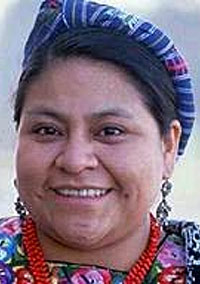
Born to a family of six in a peasant community steeped in the ancient Maya-Quiche culture, as a teenager Rigoberta Menchú participated in social reform programmes led by the Catholic Church and was active in the women's rights movement in Guatemala. Helping the Indian population to resist massive military oppression, Menchú had to go into hiding, but she went on to win the Nobel Prize for her efforts on behalf of indigenous people.
She fled Guatemala in 1981, after various members of her family were tortured and assassinated by the armed forces, and she found refuge in the home of a Catholic bishop in Chiapas, across the border in Mexico. Like her father, Menchú had become increasingly involved in the Committee for Peasants Unity, a group protesting the unequal patterns of land ownership in Guatemala. While in exile, she continued to organise resistance to oppression in Guatemala and the struggle for Indian rights by co-founding the United Republic of Guatemalan Opposition. Tens of thousands of people, mostly Mayan Indians, fled to Mexico from 1982 to 1984 at the height of Guatemala's 36-year civil war.
When Menchú accepted the Nobel Peace Prize in 1992, it was in the name of all indigenous people. She used the prize money to fund The Rigoberta Menchú Tum Foundation, which carries out projects in education, health care, community development and human rights. In July 1992, she returned to Guatemala but had to leave again after three attempts on her life.
Undeterred, Menchú moved the headquarters of the organisation back to Guatemala in 1994, feeling the need for a more grassroots-oriented approach. The foundation helped in the repatriation of many refugees. Today it places emphasis on civic education to encourage citizens' participation, such as a campaign in 1994-95 to encourage women and indigenous people to vote.
An advocate of Indian rights and ethno-cultural reconciliation, Menchú taught herself not only Spanish but also other Mayan languages. Her belief in multilingual and multiethnic solutions means that her foundation disapproves of the creation of a ministry for the indigenous peoples of Guatemala. She believes there is a risk of marginalisation, that it would become, in her own words, "a tiny bureaucratic office for Maya peoples".
In 1993, she was nominated by the United Nations as Goodwill Ambassador for the International Year of the Indigenous Peoples. Currently she presides over the Indigenous Initiative for Peace. Her autobiography, "I, Rigoberta Menchú, An Indian Woman in Guatemala", was published in 1982.

"Never on Sunday" star Melina Mercouri rose from being an actress with a worldwide following to being Greece's most famous Minister of Culture.
She was born into a family of politicians. Her grandfather, Spyros Mercouris, was once the mayor of Athens and her mother, Stamatis Mercouris, was a Member of Parliament in the Greek Democratic Left party and a former Minister of Public Works and Order. "I think that I was a political animal from when I was a very young girl, and I drank the political milk from my mother," she once said.
After finishing her secondary education, she gained admission to the National Theatre's Drama School in Athens. She graduated in 1944 and enrolled in the National Theatre. In 1945, she played Electra in Eugene O'Neil's "Mourning Becomes Electra", but her breakthrough performance is considered to be as Blanche Dubois in a 1949 production of Tennessee Williams' "A Streetcar Named Desire". Thereafter she appeared in plays by Aldous Huxley, Arthur Miller and others. In 1953, she was awarded the Marika Kotopouli prize for her work in theatre, which included performances in 60 plays.
She returned to Greece in 1955 after several years in Paris. Her first film performance, in Michalis Cacoyannis' "Stella", received much attention at the Cannes Film Festival in 1956, and many film roles followed. Among these were several by American filmmaker Jules Dassin, whom she met that year in Cannes and later married. Their collaborations included "He Who Must Die", "The Law", "Phaedra, Topkapi" and, most famously, "Never on Sunday". The latter won five Oscar nominations, and at the Cannes Film Festival, Mercouri won the Best Actress award for her performance.
Off stage, Mercouri became involved in efforts to liberate Greece from the regime of The Colonels, who staged a military coup in 1967. She was in the United States performing in "Illya Darling" at the time of the coup, a role which became difficult for her to play: "I loath playing Illya. Because it is a lie. There is no happiness in Greece today. It is a country in chains." When asked her opinion about continued American tourism in Greece at the time, she was equally blunt in her response: "If you want your dollars to support a fascist government, then go to Greece." Such comments made her deeply unpopular with the Greek dictatorship.
She records the consequences of her outspokenness in her autobiography titled "I was Born Greek": "Early on the 12th of July 1967, the phone rang. That sound. It was a journalist calling from England. 'Ms Mercouri, the Greek Minister of the Interior has declared you an enemy of the Greek people. Your property will be confiscated and you will be deprived of your Greek citizenship. Do you have any comment?' For a moment I couldn't speak, then words came: 'I was born a Greek, I will die a Greek. Mr Patakos was born a fascist. He will die a fascist.' Hours passed until my anger subsided. I swore to fight them till I die."
She travelled extensively to lead and publicise international campaigns against the junta, escaping an attempt on her life during a stage performance in Italy. She returned to Greece in 1974 when the junta collapsed and launched a career in politics, which culminated in eight years of service as Minister of Culture. During her term, she initiated the campaign for the return of the Parthenon sculptures known as the Elgin Marbles, which now reside in the British Museum.
Mercouri died on March 6, 1994 at New York's Memorial Hospital. In London, The Guardian correspondent, Helena Smith, described the reaction in Greece: "Death has cast a shadow across Greece. 'Melina, Melina, Melina, where's our Melina,' wept a middle-aged man. 'She lives in your soul, in the soul of all of us,' responded a tall blonde woman trying hard to comfort him."
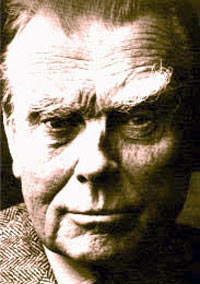
Nobel Prize-winning author Czeslaw Milosz is today one of the leading figures of contemporary Polish poetry.
Born in Szetejnie, in what was then the Russian Empire, Milosz grew up in Vilnius (today the capital of Lithuania), where he obtained a law degree and co-founded a literary circle, Zagary. In the early 1930s, he spent time in Paris, where he was influenced by his uncle, Oscar Milosz, a renowned French-Lithuanian metaphysical poet. He published two volumes of poetry and as early as 1934, received an award for his poetry from the Polish Union of Writers.
At the beginning of World War II, Milosz served at the front as a radio operator. Returning to Vilnius only to be captured by the Russians who had occupied the city, he managed to escape and cross into Poland. There he joined the resistance in Nazi-occupied Warsaw and was a witness to the 1944 uprisings.
He joined the Polish diplomatic service in 1945 and served in New York and Washington until his critical stance against the Communist regime in Poland led the government to withhold his passport in 1950. At that time, he was already well known in literary circles, yet he had run into censorship, not being allowed to publish an anthology of English and American poems, for example.
Allowed to leave Poland in 1951, Milosz was granted political asylum in Paris. He sought refuge at Kultura, the headquarters of a small but influential group of Polish émigrés in Paris.
Separated from his family and impoverished, Milosz wrote "The Captive Mind" (1953), a harsh criticism of Stalinism. The book was a huge success. In Poland, it was printed in 26 underground editions from 1977 to 1990.
His writings, banned in Poland and often not accepted by the Polish diaspora either, were initially published exclusively in Polish by Kultura's Library Series.
After "The Captive Mind", he stopped writing for five years. He described his feelings of exile and isolation, cut off from the Polish community: "The senseless task that is writing in Polish while looking out over San Francisco Bay, or like hiding words in tree hollows without any assurance that they would one day be found and read." Writing his second novel, "The Issa Valley" (1955), an account of growing up in Lithuania, was a kind of therapy, he said.
Winning the Prix Littéraire Européen in 1953, he was reunited with his family and in 1960, he left for Berkeley, part of the University of California, as a visiting lecturer, where he taught Slavic Languages and Literature. In 1965, he edited an anthology of Polish poetry.
In 1981, he returned to Poland for the first time since 1951. But with the declaration of martial law in December 1981, his books were again banned in Poland. He presided over the French committee in support of the banned trade union movement, Solidarity, or Solidarnosc.
After winning the Nobel Prize, his fame grew: his poem "You Who Wronged a Simple Man" was reprinted on Solidarnosc flyers and also inscribed on the base of a monument to fallen shipyard workers killed during the 1970 protests in Gdansk. It was not until 1991 that that one of his books, "Provinces", was published in Poland before being published in exile.
Counting himself as among the last Polish Lithuanians, Milosz recalls the city in which he grew up and its distinct multiethnic environment: "It was a linguistic, cultural, ethnic and religious mosaic which we will never find again."
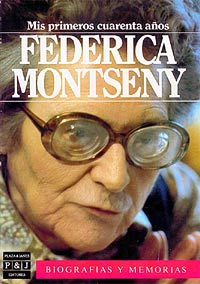
Federica Montseny - an author, editor, feminist and anarchist activist for more than five decades - emerged during the 1930s as the first woman minister of the Spanish government. With the triumph of the leftist coalition that made up the newly-elected Republican government in 1936, progressive reforms and agendas took pride of place, and Montseny helped place feminist and labour concerns on the political map.
She was born in a working-class neighbourhood of Madrid. Her parents were Catalan libertarian activists and educated their only daughter at home. At the age of 17, Montseny joined the underground anarchist labour union, CNT (Confederación Nacional del Trabajo), and began writing for anarchist journals. Her first novel, part of a series titled "La Novela Roja", was published under the pseudonym, Blanca Montsan.
In 1931, when the Second Republic was declared, Montseny was married to anarchist Germinal Esgleas and had a child. She continued to dedicate herself to the family's anarchist press and to trade unionism. She engaged in lecturing tours throughout Spain, disseminating information on labour union policies. Within a short period of time, her credentials were widely acknowledged and Montseny emerged as a prominent member of the labour union's National Committee. In 1936, the left-wing government appointed her as Minister of Health and Public Assistance.
After cutting back the ministry's bureaucracy, Montseny supported the appointment of women into leadership positions. During her six months as Minister of Health and Human Services, she laid the groundwork for the Republican refugee programme and a national programme to evacuate orphaned and displaced children from besieged cities. She turned her attention to the health needs of women, promoting sex education, family planning and legalised abortion.
With the fall of the Largo Caballero government and the victory of the Spanish Communist Party in May of 1937, Montseny, along with all other anarchist cabinet members, resigned from their posts. She resumed her trade union activities during the civil war.
Pregnant with her second child, Montseny remained in Barcelona with her family during the last year of the civil war and joined the massive refugee flow of defeated Republicans over the Pyrenees into France. She continued her work, rebuilding the trade union in exile until the German occupation of France. She was imprisoned in 1942, awaiting extradition to Spain. But since she was by then pregnant with her third child, she was instead confined to house arrest until the end of World War II.
With the liberation of France in 1944, Montseny continued her work with the Spanish anarchist movement, denouncing Franco's regime during lecture tours throughout Europe. Even after the death of Franco, she chose to remain in exile.
Her autobiography, "Mis primeros cuarenta anos" ("My First Forty Years"), was published in 1987. Montseny died in January 1994 at the age of 88 in Toulouse.
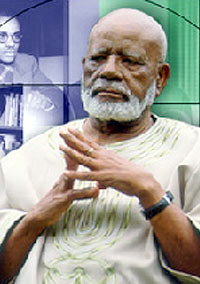
Anti-apartheid campaigner Es'kia Mphahlele grew up on the streets of Pretoria and after two decades of exile, returned to found a department for African studies at one of South Africa's most prestigious universities.
The Nobel Prize-nominated author describes his early life in "Afrika My Music", which portrayed "the drama of life as lived in the ghetto". He started out in life as a teacher at a Soweto high school in 1945. When the Afrikaners took power in 1948, he established himself as a fierce critic of the racist educational policies they introduced. In 1952, he was banned from teaching and in 1955 he joined the African National Congress (ANC).
"The '50s was a highly optimistic period. It was a decade of real idealism. The Nationalists came to power in 1948 and set about institutionalising division and inequality. But it was so insidious that it wasn't until the massacre at Sharpeville in 1960 that the full horror of what was happening sunk in," he remembers.
After being banned from teaching, Mphahlele went to work as a journalist for Drum, a South African magazine recognised for its serious reporting, often in extremely dangerous conditions.
Mphahlele once wrote: "Life for an oppressed person is one long, protracted, agonising compromise." By 1957, he felt unable to live under apartheid any longer and fled to Nigeria. He described the conditions that precipitated this decision in his second autobiography, "Down Second Avenue": "I was suddenly seized by a desire to leave South Africa for more sky to soar. I had been banned from teaching, and conditions were crushing me and I was shrivelling in the acid of my bitterness."
During his years in exile, Mphahlele lived in several countries. He earned his doctorate at the University of Denver, Colorado, and held teaching and research posts in Nigeria, France, Kenya and Zambia. He finally settled in Pennsylvania, where he lived until his eventual return to South Africa. He wrote extensively throughout this period, often using irony to portray the racial tensions under apartheid.
But he found writing about his homeland from afar increasingly difficult, and decided to return in 1977. "As long as I cannot remember a place by its smells and the texture of its life, I cannot create a sustained literary work out of it," he says.
Mphahlele found it difficult settling back in South Africa. He was still a "listed person" under security legislation, which made it a crime for anyone to publish anything written by him or to quote him in the press. But he continued to write and teach, and eventually initiated the creation of a department for African studies at the Witwatersrand University in Johannesburg.
He also began travelling extensively in rural suburbs, collecting poetry that existed only in the oral tradition, and later formed the Funda Centre, a cultural and educational project on the edge of Soweto.
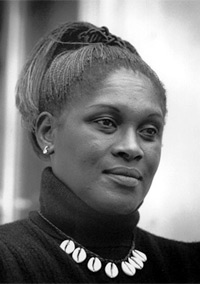
Yolande Mukagasana
As a Tutsi nurse from Kigali, Yolande Mukagasana managed to escape the Rwandan genocide and flee to Belgium, where she was granted refugee status in 1995. In her book "La mort ne veut pas de moi" ("Death Does Not Want Me"), she recounts how she survived while her husband, three children, and many of her relatives and friends died.
During the 100-day genocide, she hid in the bushes, behind a sink, and was even a guest in the house of one of the perpetrators of the mass murder.
When she arrived in Belgium, she found her professional qualifications were not recognised, in spite of the fact that she had undergone her specialisation there several years earlier. She took a job in an old folks' home.
In 1999, Mukagasana went back to Rwanda, accompanied by Greek photographer Alain Kazinierakis, to interview both victims and perpetrators of the 1994 genocide. This material has been shown in a travelling exhibition, "Les Blessures du silence", ("The Wounds of Silence"), organised by Mukagasana together with Médecins sans Frontières (Doctors Without Borders).
Mukagasana underlines the need for reconciliation and advocates rehabilitation projects such as re-enacting and narrating experiences through theatre. She is part of a theatre group, Groupov, which has staged a production called "Rwanda 1994". Together with Kazinierakis, in December 1999, she co-founded Nyamirambo, point d'appui, which hopes to serve as a platform for research, a foundation for memory and an act of rebuilding.
"The genocide can not be interpreted as a humanitarian drama. This would mean refusing to analyse the way a genocide can be carried out," says Mukagasana.
Through her own testimony and the testimonies she gathers, the complex aspects of the Rwandan genocide emerge. Mukagasana points to the ethnic quotas policy that was introduced after Rwanda's independence in 1961, and caused a large outflow of refugees to neighbouring countries; the complexity of a genocide where henchmen and victims shared the same language, religion, culture and were often living side by side; as well as the meticulous preparation for the genocide. She believes it is important to recognise that often the perpetrators were victims of their own acts.
"Generalisations only favour the killers", says Mukagasana, "I was saved by a Hutu."
Recognising the strong oral tradition of Rwanda as a principal method of communication, she advocates the need to break the silence that revolves around the genocide. She goes back to Rwanda several times a year, although she is not able to stay there permanently due to her haunting memories. "I am like a polygamous husband - I have a family in Belgium and one in Rwanda," she says jokingly.
Following her flight to Belgium, she adopted her younger brother's three children, who were left without their parents. Back in Rwanda, she gave her house to three orphans and hopes that it will remain open for others in need. She would also like to build a memorial there for children who were killed in Rwanda, as "no one remained alive to testify in my village".
Mukagasana has written a continuation of her first testimony, "N'aie pas peur de savoir" ("Don't Be Afraid to Know") and is also working on a book of testimonies of perpetrators of the Rwandan genocide. She won the Ulrich-Zwiener Stiftung prize in 1999 for her human rights work.
Two testmonies, "Evariste" and "Clemence" have been taken from the 2001 edition of "Les Blessures du Silence".
Clemence
Clemence K. 24, Nyamata, survivor
We all fled to the church. The Interahamwe were around us, but did not speak to us. Soldiers encircled us, saying they would protect us. We were very happy. But the following Sunday, the soldiers and the Interahamwe got together to murder us.
I fainted from the blow of a club. I woke up in the evening amidst the bodies of my family. Everyone was naked, like me. I hid in a field of sorghum. After three days, I was hungry and I went towards my house. I may have walked four kilometres, still naked. I hid in the shrubs whenever I saw people.
When I got home, I saw that the house had been destroyed and I asked our Hutu neighbours for something to eat. They laughed. They called the neighbours. I was surrounded and forced to sit on the floor. People were laughing, asking me where my family was. I didn't answer, I hid my breasts with my arms. Finally, one of them took me away and locked me up, still naked, in a room with no windows. During the day, he killed. In the evening he beat me and raped me.
When I became pregnant, first I was ashamed. But today, I must say that this child is the only treasure I have. I called her Umumararungu -the one who cures my loneliness.
Evariste
Evariste N. 15, in prison in Butare (Karubanda)
E.N. " A group of killers came to get me at my house. They told me to come with them. I refused. But they threatened to kill my mother, who is Tutsi, if I didn't go. So I got scared and I went with them. They showed me three children to kill. I refused, but a neighbour forced me to take a machete. I still refused, but I was struck. So I took it. I killed the children; I had no choice.
Y.M. - What did your mother do when you told her?
E.N. - She hit me...
Y.M. - Did you know these children?
E.N. - Yes, they were our next-door neighbours. They used to come to eat with my parents, and I went to their house.
Y.M. - And now, what is the relationship?
E.N. - Their mother was the one who had me put in prison. The friendship between the two families is broken...
Y.M. - What does the court say?
E.N. - That I have to do rehabilitation.
Y.M. - And the man who took you there, what is your relationship with him?
E.N. - I was one of the witnesses against him, because he killed me too. I'm not a child any more, I'm a killer...

Maryam Mursal's incredible voice and striking appearance have captivated listeners since she was a teenager. She began singing professionally in 1966 in Mogadishu, the first woman singer in a male-dominated Islamic society.
As civil war tore Somalia apart, Mursal was separated from her husband by the fighting. Threatened by the clashes in Mogadishu, she fled, taking her children with her. The flight took them on foot and in small vehicles across Kenya, only to be met by further threats. So the family trekked back through the deserts of Somalia and Ethiopia to Djibouti, where they finally received help from the UN and were given asylum by the Danish Embassy.
Even while fleeing, Mursal felt a need to speak out, and wrote songs about the war and her own flight. In Denmark, she teamed up with Danish arranger Søren Kjaer Jensen. Jensen had come across Mursal's music while working in Somali refugee camps as a freelance photographer in 1986, and had recorded her extraordinary voice from a radio broadcast.
When Jensen was invited to perform at a multimedia show for newly-arrived Somali refugees in Denmark, he heard her singing to 300 fellow refugees and realised it was the same voice. Mursal became the first Somali artist to release an international album. The songs on her solo CD, "The Journey", were written during her seven-month trek through the deserts.
Together with Jensen, Mursal is merging ancient sounds from Somalia with contemporary western music. She has begun recording with Real World record company, as the lead singer of a traditional Somali band, Waaberi. She now lives in Denmark, where her family is now almost united, but she hopes to return home to Somalia one day.
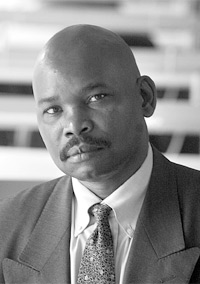
Human rights lawyer Makau Mutua never gave up hope - not during his student days fighting the political system in Kenya and not even when he was forced to leave his country.
While attending the University of Nairobi Law School, he became the Secretary General of the Students Union. He was arrested and detained for organising students to fight against one-party rule, official corruption and human rights violations in Kenya. He was expelled from the University of Nairobi during his second year in law school, and fled the country in May 1981.
With the help of UNHCR, Mutua became one of the first Kenyans to be granted asylum in Tanzania. The UN refugee agency provided him with financial assistance, which enabled him to attend the University of Dar-Es-Salaam.
In 1982, he survived an attempted kidnapping by security forces, which planned to return him to Kenya. He sought to leave Tanzania, feeling that it had become unsafe for Kenyan refugees. He was once again assisted by UNHCR, which paid for his ticket to the United States, permitting him to enrol in the world-famous law programme at Harvard Law School.
Mutua is now a Professor of Law at the State University of New York, Buffalo School of Law. He is also the Director of Human Rights Center, and is co-founder and Chair of the Nairobi-based Kenya Human Rights Commission. He has written extensively on human rights, international law and African politics.
In an inspirational message to citizens of the world, Mutua writes: "Refugees must never despair and remember to keep on working hard, even when the days and nights are long and lonely. Quite often, there is a light at the end of the tunnel. The ability to hope and dream of a better day kept me motivated and inspired. Without hope, I would have been lost."

Vladimir Vladimirovich Nabokov, author of "Lolita" and one of the outstanding literary figures of the 20th century, lived a life of exile.
Born into a wealthy and aristocratic family in St. Petersburg, Nabokov spent his childhood between the city and the family estate of Vyra some 50 miles to the south. It was there that he cultivated his passion for butterflies, knowledge that later turned out to be surprisingly useful.
Fleeing the Red Army in 1919, the Nabokovs travelled, via Constantinople, to England, where Vladimir enrolled at Cambridge University. After graduating in 1923, he moved to Berlin, where he published short stories and poetry, supplementing his income by giving lessons in English and tennis; translating; appearing as an extra in films; acting in theatrical productions and by composing chess problems and the first Russian crossword puzzle.
In 1925, Nabokov married Vera Slonim, with whom he had one child, Dimitri.
Fleeing Berlin in 1937, the family travelled to Prague and moved to France, but in 1940, they boarded a ship for America. Nabokov initially worked for the Museum of Natural History in New York, classifying butterflies. He published two papers on the subject and also received payment for his entomological drawings. He taught at Wellesley College and Cornell University, delivering lectures on Flaubert, Joyce, Turgenev and Tolstoy. The Atlantic and the New Yorker began publishing his short stories, which he wrote in English. In 1945, he and his wife became American citizens.
It was in the early 1950s that he composed the best-selling novel "Lolita" that was to generate a storm of moral outrage for depicting a middle-aged man's desire for a 12-year old nymphet. The novel's huge success allowed him to abandon teaching and dedicate himself entirely to writing. He eventually forged a style that straddled the three cultures he had known: Russian, European and American.
In 1959, Nabokov moved to Switzerland and pursued his passion for butterflies in the Alpine pastures. He died in Lausanne on July 2, 1977.